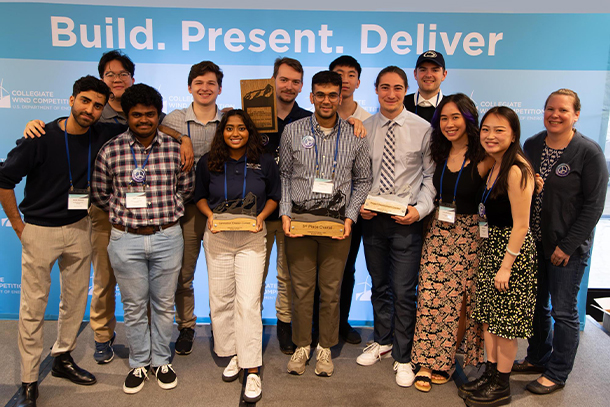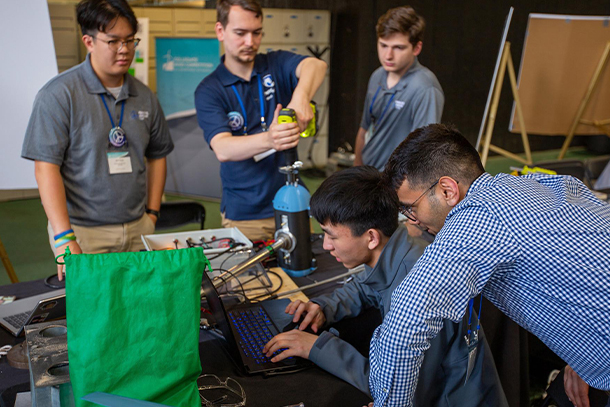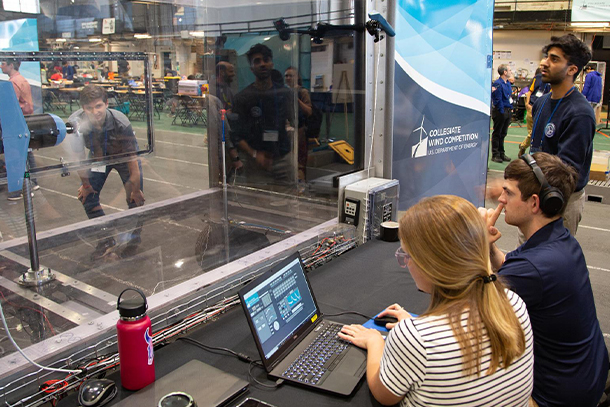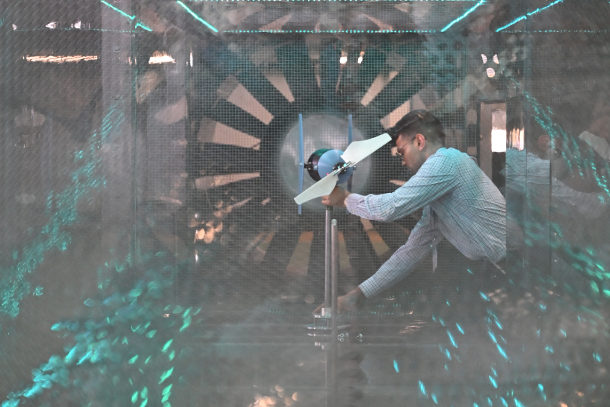
Members of the Penn State Wind Club at the 2023 Collegiate Wind Competition with their award plaques. Note: the team was awarded third place at the competition. However, a scoring error was discovered and corrected, which resulted in the club receiving second place overall. Credit: National Renewable Energy Lab. All Rights Reserved.
Diversity, inclusivity are driving forces behind wind energy club’s success
October 24, 2023
By Kevin Sliman
Editor’s note: This article originally appeared on Penn State News. It features numerous engineering students in the Penn State Wind Energy Club, as well as co-advisers Mark Miller, assistant professor of aerospace engineering, and Susan Stewart, teaching professor of aerospace engineering.
UNIVERSITY PARK, Pa. — The Penn State Wind Energy Club was awarded second place at the U.S. Department of Energy’s 10th Annual Collegiate Wind Competition. The club also won the Project Development Contest and the Connection Creation Contest.
For eight of the past 10 years of competition, Penn State has placed in the top three, five of which were first-place finishes. Although the competition calls for students to demonstrate their technical, design and development skills, team members said they attribute much of its success to its diversity and inclusiveness.
Mark Miller, a co-faculty adviser and an assistant professor in the Department of Aerospace Engineering, said the students in the club graduate with extensive knowledge and experience.

Members of the Wind Energy Club work to prepare their equipment at the Collegiate Wind Competition. Credit: National Renewable Energy Lab. All Rights Reserved.
“Our students work on one of the most collaborative and multidisciplinary student projects available,” said Miller. “The Collegiate Wind Competition requires them to not only build a functional wind turbine prototype, but also design and plan an entire wind farm in the project development portion plus create and maintain connections with the community. Our alumni graduate with perspective and real-world experience regarding the challenges and rewarding nature of functioning as a team.”
Miller added that the key skills that the club provides are difficult to teach in a traditional classroom format. Team members dedicate multiple hours a week to meetings and work sessions to prepare for the Collegiate Wind Competition.
“While the workload can be high, for the students who stay engaged with the club it has served them well after graduation,” he said. “Many of our students have found a real passion for wind energy and have gone on to work in the wind industry after graduation.”
Susan Stewart, a co-faculty adviser and teaching professor in the Department of Aerospace Engineering, said the club has been an evolving entity since the first Collegiate Wind Competition in 2014.
“Through very strong executive student leadership, this incredible team has found ways to recruit, engage and retain a diverse group of students from across the University by creating a fun, inclusive environment while pursuing this very challenging competition throughout each academic year,” she said.
Stewart added the reason for the club’s achievements can also be found in its processes.
“The first key is having strong mechanisms in place to transfer knowledge from year to year,” she said. “Another is always pushing to explore new designs such that there are always opportunities for new club members to learn and get involved. Members put a lot of hard work and dedication into the competition, and it is fantastic when this shows in their final placements at the competition.”
Shana Hartwick is an undergraduate student in the Schreyer Honors College and the secretary of the Wind Energy Club for the 2022–23 year. She said her experience in the club taught her about three unique, but crucial, aspects of the wind energy industry: business, technology and public outreach.

Members of the Wind Energy Club look on as their wind turbine is tested. Credit: National renewable Energy Lab. All Rights Reserved.
“As an engineering major, gaining a holistic view of the wind energy industry allowed me to realize that seemingly engineering-heavy industries need more than just technological advancement to increase the clean energy stockpile,” she said. “More specifically, I’ve been a member of the group that works on the Turbine Prototype and Turbine Testing contests in the Collegiate Wind Competition. Working with the aerodynamics subsystem so early on in my aerospace engineering education exposed me to advanced engineering concepts that bolstered my ability to succeed in my classes later. I also developed my hands-on skills and furthered my teamwork experience.”
Hartwick said the team seeks to increase its diversity annually.
“The team has seen that an increase in diversity — from race to gender to academic college — increases the number of unique perspectives, which allows us to approach the competition in more effective ways,” she said.
Satyam Patel, the club’s 2022–23 president and a recent Penn State alumnus who graduated with a degree in electrical engineering, agreed that diversity is a key component to the club’s success.
“We have the largest team competing at the Collegiate Wind Competition, and we strive to ensure everyone feels comfortable and included on the team,” he said. “We actively encourage those underrepresented in the wind energy industry to join our team, and we annually recruit from organizations like the Society of Women Engineers and the Multicultural Engineering Program.”

A different perspective often reveals new insight, as the Wind Energy Club has found. Credit: National Renewable Energy Lab. All Rights Reserved.
The club also hosts activities like hikes, group ice skating and dinners, which Patel said has given the team a strong sense of camaraderie.
“We provide many leadership opportunities that are open to new members, and we have a system of acknowledging members who go above and beyond,” he said. “We have also just elected our first ever all-women executive board for the 2024 competition year.”



